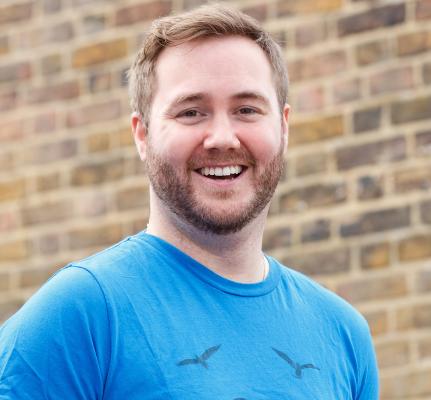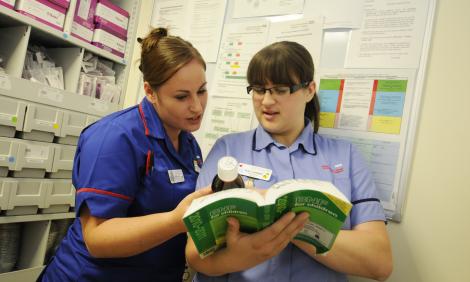Children's nurse
Child nursing involves everything from nursing a sick newborn to an adolescent road accident victim. You'll need to consider the care and support needed by the wider family, including parents and carers.
Why choose children's nursing
There are many reasons why you should consider a career as a children’s nurse. It offers you the chance to make a difference, a high degree of flexibility and a career with excellent employment prospects.
Working life
Nursing a child is not just a question of caring for a small adult. Children have very specific health needs and you need to understand how a healthy child develops towards adulthood to minimise the impact of illness. This involves working in closely with the parents or guardians.
Communication is also factor when treating children. Adults can express their feelings and can identify the severity and nature of pain. A child may not be able to communicate this in such detail and the nurse needs to interpret child’s behaviour and reactions. Children's nurses need to be able to spot when a child's health takes a turn for the worse, which can often happen rapidly.
A child’s care takes place in a range of settings including hospitals, day care centres, clinics and in the community such as child's home
Children's nurses are part of multidisciplinary teams that look after patients. You will be at the centre of teams that include doctors, hospital play staff, healthcare assistants, newborn hearing screeners, psychologists and social workers.
Ewout Van Sabben
Student Children's Nurse
Read Ewout's storyTo be able to go into that situation and be able to help calm the child down and assure the parent that everything was ok was incredible.

Entry requirements
To become an children's nurse the main route is through a degree course at university. Entry requirements for these courses can vary depending on where and how you’d like to study so it's important to check with universities. You can find a child nursing courses at the bottom of this page.
Typically you'll need a minimum of five GCSEs at grade 4/C or above, possibly in English language or literature and a science subject, plus two A levels or equivalent level 3 qualifications, such a T level or BTEC for an undergraduate degree. Some universities may ask for three A levels or equivalent. If you already have a degree, you might be able to study for a postgraduate qualification.
There are other routes into child nursing such as nurse degree apprenticeships and nursing associate apprenticeships.
Annual payments
If you're eligible, you'll receive at least £5,000 a year towards your studies while at university. Your personal circumstances may mean you could receive more. And the good news? You'll never have to pay it back. Find out more.
Other routes into children's nursing
Nursing degree apprenticeships are available with some employers and numbers are expected to continue to grow. Increasing opportunities to apply for nursing associate apprenticeships are also expected. This can lead to nursing degrees or nurse degree apprenticeships.
Must have skills
Don’t forget - academic qualifications aren’t everything. Communication and interpersonal skills are crucial, as well as strong judgement, be able to teach advise and manage people.
If you're applying for a role either directly in the NHS or a university course, you'll be asked to show how you think the values of the NHS Constitution apply in your everyday work.
Training and career development
Once you have qualified as a children's nurse, there are a wide range of opportunities. You could specialise in a certain field such as health visiting or school nursing. You may want to move into management, teaching or clinical research.
Pay and benefits
Your standard working week will be around 37.5 hours on shift pattern which can include nights, early starts, evenings, weekends and bank holidays. As a child nurse, you’ll be paid on the Agenda for Change (AFC) pay system, typically starting at band 5.
You’ll also have access to our generous pension scheme and health service discounts, as well as 27 days of annual leave plus bank holidays.
Displaying 1 - 5 of 127 matches
-
Nursing - Adult and Child (Dual Award)
Birmingham City University
View courseOpens in a new window
- Qualification
- Master of Science - MSci
- Study mode
- Full-time
- Duration of the course
- 4 Years
- Leading to a career in
- Nursing (Adult), Nursing (Children/ Paediatric)
- Contact details
- [email protected] 0121 331 6295
- Region
- West Midlands
- Admissions address
- Westbourne Road
Birmingham
B15 3TN
United Kingdom
-
Nursing (Adult and Child)
Edge Hill University
View courseOpens in a new window
- Qualification
- Master of Science (with Honours) - Msci (Hon)
- Study mode
- Full-time
- Duration of the course
- 4 Years
- Leading to a career in
- Nursing (Adult), Nursing (Children/ Paediatric)
- Contact details
- [email protected] +44 (0)1695 657000
- Region
- North West
- Admissions address
- St Helens Road
Ormskirk
L39 4QP
United Kingdom
-
Nursing - Adult and Child (Dual Award)
Birmingham City University
View courseOpens in a new window
- Qualification
- Master in Science (with Honours) – MSci (Hon)
- Study mode
- Full-time
- Duration of the course
- 4 Years
- Leading to a career in
- Nursing (Adult), Nursing (Children/ Paediatric)
- Contact details
- [email protected] 0121 331 6295
- Region
- West Midlands
- Admissions address
- Westbourne Road
Birmingham
B15 3TN
United Kingdom
-
Nursing (Adult and Children and Young People)
Robert Gordon University
View courseOpens in a new window
- Qualification
- Bachelor of Science (with Honours) - BSc (Hons)
- Study mode
- Full-time
- Duration of the course
- 4 Years
- Leading to a career in
- Nursing (Adult), Nursing (Children/ Paediatric)
- Contact details
- [email protected] 01224 262728
- Region
- Scotland
- Admissions address
- Garthdee House
Garthdee Road
Aberdeen
AB10 7QB
United Kingdom
-
Nursing (Adult Health and Child Health)
University of Plymouth
View courseOpens in a new window
- Qualification
- MNurs
- Study mode
- Full-time
- Duration of the course
- 4 Years
- Leading to a career in
- Nursing (Adult), Nursing (Children/ Paediatric)
- Contact details
- [email protected] +44 (0) 1752 585858
- Region
- South West
- Admissions address
- Drake Circus
Plymouth
PL4 8AA
England
If you cannot find a vacancy in your area, visit NHS Jobs to search for more vacancies.





